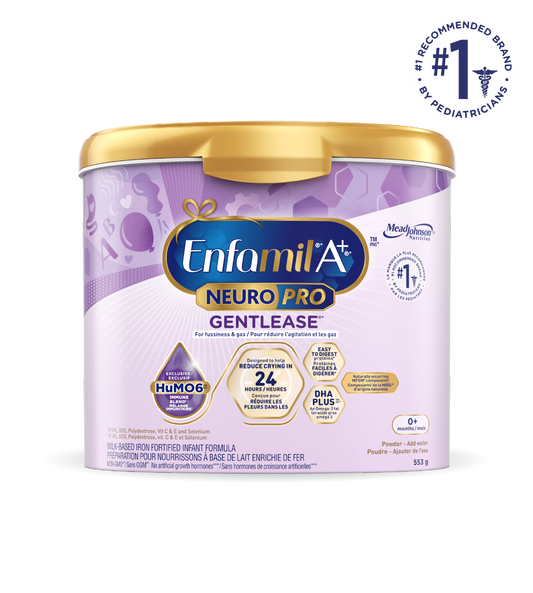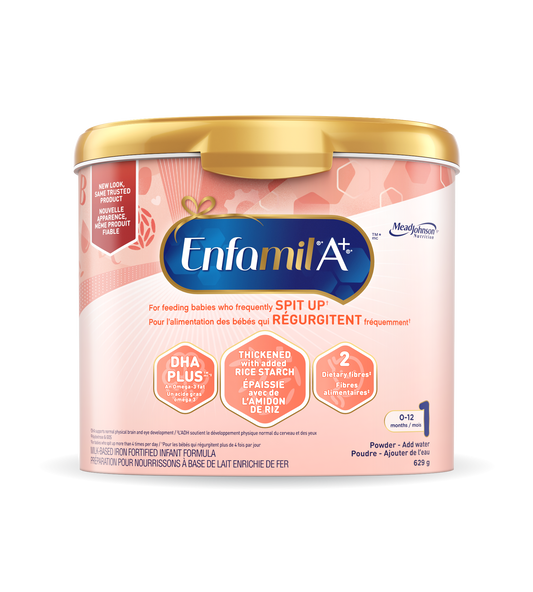SKIP TO CHAPTER

This is especially important when it comes to a feeding issue because the wrong information could keep you from finding the right approach.
Below are five common misconceptions that doctors hear every day. Do any of these sound familiar? Read on to find out the real story around that particular topic — and use the information to help manage your baby's feeding issue.
1. Switching brands of formula will solve my baby's feeding issue.
The answer is false. Many Moms think that if their baby is having a feeding issue, switching from one brand of regular formula to another is the answer. If this is the case, what you need to find is another type of formula, not just another brand. Depending on your baby's situation, what's needed is a formula tailored to help with feeding issues — and the doctor can make that recommendation.
These types of formulas are individually formulated to help with common feeding issues including frequent spit-up, lactose sensitivity and cow's milk protein allergy including colicky babies*. So your baby feels better while still getting the complete nourishment he needs for healthy development.
*Due to cow’s milk protein allergy
2. When switching from a regular formula to one made for feeding issues, you can't make a straight switch.
Actually you can. Whether you're transitioning from a regular formula to a formula made for feeding issues or just the opposite, there's no need to gradually mix the new formula with the one you're using now. Both regular and specialty formulas have the nutritional content babies need to support their growth and development. The difference between the two is that specialty formulas are designed with the necessary changes for the dietary management of feeding issues.
The important thing to remember is that even though you can switch formulas immediately, it may take 2-3 weeks or even longer in some cases to know if the formula is helping. When the feeding issue hasn't improved after just a few feedings, doctors often get a call from Moms who are concerned — so remember to give it a little time and don't jump to immediate conclusions.
3. If your baby is on a specialty formula, he will eventually need to switch to a regular formula to ensure he receives complete nutrition.
This is not the case. If your baby has a feeding issue, the doctor may recommend a specialty formula. These formulas have been individually tailored to help with common feeding issues while still providing the nourishment your baby needs for healthy development. Once the issue is addressed and the baby is doing well, many Moms continue to use these tailored formulas because they not only help babies feel better, they also provide complete nutrition to help him reach key milestones.
4. There's a certain standard my baby should follow when it comes to bowel movements.
Not at this time. Bowel movements differ quite a bit between babies and are greatly influenced by their diet. Breastfed newborns may have up to ten stools a day, often after each feeding, while others may have only one stool every other day. By 3-6 weeks of age, this can slow down to just one stool a week and still be normal. If your baby is formula-fed, he may have one bowel movement a day.
Constipation. A common misconception is that if your child does not have a bowel movement every day, he's constipated. Constipation is characterized by harder stools that are more difficult to pass.
Infant diarrhea. If your baby's bowel movement is large, frequent, thin, watery, mucus-y and foul-smelling, it's usually diarrhea. This can be related to other illnesses, and you should contact your baby's doctor. Dehydration can be a concern when diarrhea occurs.
Consistancy and colour of stools. If your baby is breastfed, his stools will be a light mustard colour and range from very soft to loose and runny. If you're formula-feeding your baby, his stools will be tan or a deeper yellow than a baby who is breastfed, but not quite as firm as peanut butter.
5. If my baby has a cow's milk protein allergy, he won't be able to tolerate dairy products later in life.
For the most part, this is false. Cow's milk protein allergy is usually a temporary condition that most children outgrow by the time they reach school age. In fact, most children outgrow cow's milk protein allergy by the time they're five. When a baby reaches one year of age (this age may vary based on the doctor's recommendation), the doctor may recommend reintroducing foods with cow's milk. This should always be done carefully and under the supervision of the doctor, who may perform a medically supervised food challenge in the office or hospital, during which the suspected food is given to the child in controlled amounts over a period of time. If no reactions occur, many children who had cow's milk protein allergy as babies can begin to eat a normal diet, including milk and dairy products.









